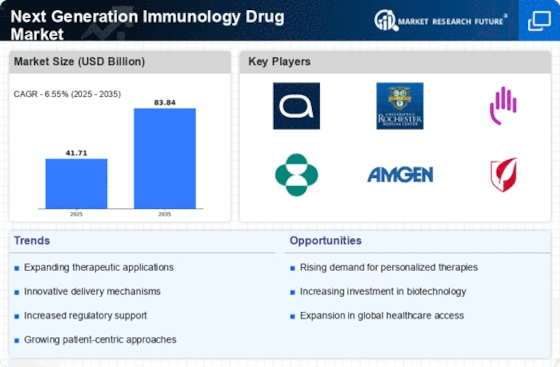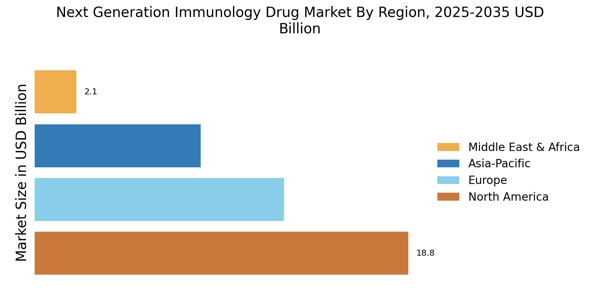Advancements in Biotechnology
Technological advancements in biotechnology are significantly influencing the Next Generation Immunology Drug Market. Innovations such as CRISPR gene editing, monoclonal antibodies, and biologics are revolutionizing the way immunological disorders are treated. These technologies enable the development of more effective and targeted therapies, which are essential for managing complex diseases. The biotechnology sector has seen substantial investment, with funding reaching billions annually, indicating a robust interest in developing next-generation immunology drugs. Furthermore, the integration of artificial intelligence in drug discovery processes is streamlining research and accelerating the time-to-market for new therapies. As these advancements continue to evolve, they are expected to enhance the efficacy and safety profiles of immunology drugs, thereby driving market growth.
Growing Awareness and Education
There is a notable increase in awareness and education regarding immunological disorders, which is positively impacting the Next Generation Immunology Drug Market. Patients and healthcare professionals are becoming more informed about the symptoms and treatment options available for autoimmune diseases. This heightened awareness is leading to earlier diagnosis and treatment, which is crucial for improving patient outcomes. Furthermore, educational campaigns and initiatives by healthcare organizations are promoting understanding of the importance of immunology drugs. As patients become more proactive in seeking treatment, the demand for next-generation immunology drugs is expected to rise. This trend underscores the importance of education in driving market growth and ensuring that patients receive timely and effective therapies.
Rising Prevalence of Autoimmune Diseases
The increasing incidence of autoimmune diseases is a primary driver for the Next Generation Immunology Drug Market. Conditions such as rheumatoid arthritis, lupus, and multiple sclerosis are becoming more prevalent, affecting millions worldwide. According to recent estimates, autoimmune diseases impact approximately 5-8% of the population in various regions. This surge in prevalence necessitates innovative therapeutic solutions, propelling the demand for next-generation immunology drugs. As healthcare systems strive to address these challenges, pharmaceutical companies are investing heavily in research and development to create targeted therapies. The focus on personalized medicine further enhances the potential of these drugs, as they can be tailored to individual patient profiles, thereby improving treatment outcomes. Consequently, the rising prevalence of autoimmune diseases is likely to sustain growth in the Next Generation Immunology Drug Market.
Regulatory Support for Innovative Therapies
Regulatory bodies are increasingly supportive of innovative therapies, which is a key driver for the Next Generation Immunology Drug Market. Streamlined approval processes and incentives for developing breakthrough therapies are encouraging pharmaceutical companies to invest in next-generation immunology drugs. Recent regulatory frameworks have been established to expedite the review of novel treatments, particularly those addressing serious or life-threatening conditions. This supportive environment is fostering innovation and enabling faster access to new therapies for patients. As regulatory agencies continue to adapt their policies to facilitate the introduction of advanced immunology drugs, the market is likely to benefit from a more dynamic and responsive landscape, ultimately enhancing patient care.
Increased Investment in Research and Development
The Next Generation Immunology Drug Market is experiencing a surge in investment in research and development (R&D). Pharmaceutical companies are allocating significant resources to discover and develop innovative therapies that address unmet medical needs in immunology. In recent years, R&D spending in the biopharmaceutical sector has exceeded hundreds of billions, reflecting a commitment to advancing treatment options. This influx of capital is fostering collaboration between academia and industry, leading to breakthroughs in drug development. Additionally, government initiatives aimed at promoting biomedical research are further bolstering R&D efforts. As a result, the increased investment in R&D is likely to yield a pipeline of next-generation immunology drugs, enhancing the market's growth trajectory.

















